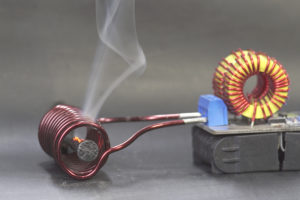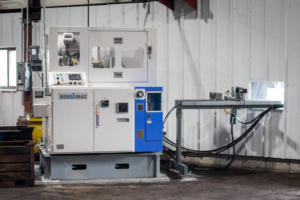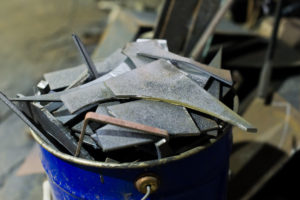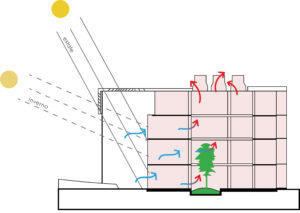One challenge forging manufacturers must face is finding better ways to sustainably mass produce forgings. Some forging companies address this challenge by researching and adopting new technology and by discovering innovative ways to reuse energy and reduce waste. In honor of Earth Day and Keep America Beautiful month, we want to highlight some of the environmentally friendly methods we practice at Trenton Forging, starting with induction heating.
What Is Induction Heating?

Induction heating is a process that uses alternating electrical current to produce alternating magnetic fields within a coil. The resistance that occurs induces heat from within the material located in the coil. While induction heating is not a new technology, it is a more eco-friendly option when compared to heating via gas-fired ovens and furnaces.
Why Induction Heating Is Environmentally Friendly
Primarily, induction heating is an environmentally friendly process because it doesn’t rely on fossil fuels (coal, crude oil, and natural gas). The land degradation and water pollution from fossil fuel mining have upended critical wildlife and jeopardized our waterways, including our public water systems.
Induction heating also doesn’t contribute to harmful CO2 emissions. Carbon emissions from manufacturing can linger in the atmosphere for thousands of years. The result is trapped heat within our atmosphere that contributes to smog and air pollution.
Lastly, induction heating is a more energy-efficient heating method; induction heating equipment maintains consistent temperatures and, when compared to gas furnaces, produces less waste heat.
Trenton Forging’s Other Net-Zero Efforts
Beyond induction heating, we continue to find ways to expand our net-zero efforts while still providing the high-quality forgings and quick turnaround times that we’re known for. Some of our current practices include:
Eliminating Waste With CNC Carbide Cold Saws

In the past, mechanical shears were used to cut metal bars into billets. While quick, this process wasn’t energy efficient or very cost-effective. Since 2018, our team at Trenton Forging has been using CNC carbide cold saws. These saws are programmed to find the most efficient way to segment bars, which significantly reduces scrap and helps us minimize production costs.
Recycling Steel

Trenton Forging manufactures millions of forgings every year. Although we take steps to reduce our metal scrap, there isn’t a way to totally eliminate it. Because steel scrap is inevitable, we’ve opted to recycle it.
Any scrap that we produce during the forging process is sent to a steel mill for recycling. After the scrap is transformed back into raw material, we buy the material from the steel mill and use it to produce more forgings.
Using recycled materials has helped us reduce our carbon footprint while still producing high-quality custom forgings.
Zero-Energy Ventilation

Last but not least, we utilize a completely passive cooling system in our new press facility. Passive cooling systems can use cross-ventilation and stack ventilation; our system relies on the stack effect, where hot air naturally flows upward while cooler air flows back down.
This type of system is unique, because it relies on smart, energy-efficient building design, and not on mechanical or electrical devices, like fans. Thus, it reduces heat gain and encourages cooling without using any energy at all.
Trenton Forging: An Innovative & Sustainable Leader
Family-owned and -operated, Trenton Forging has been an industry-leading forging manufacturer for over five decades. We specialize in producing asymmetrical and symmetrical custom forgings from steel, stainless steel, carbon steel, steel alloys, and microalloyed steel.
We’re proud to be a name that’s synonymous with quality and innovation; we will always look towards the future, and aim to find newer, better, and more sustainable ways to produce forgings.
If you have questions about our forging processes, or would like to request a quote, please contact us today.


